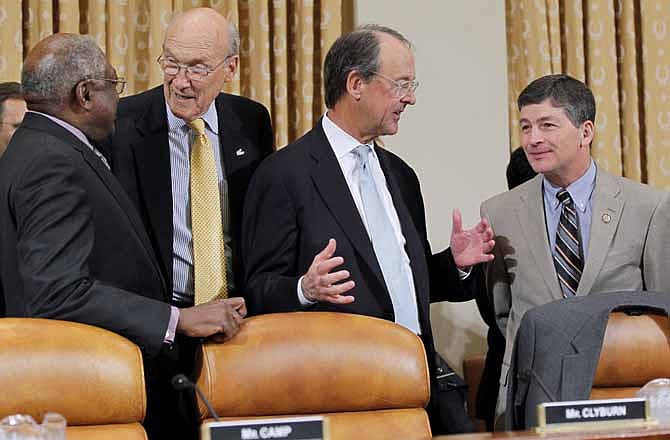CHEYENNE, Wyo. (AP) - Alan Simpson, the plain-spoken former U.S. senator from Wyoming, said Tuesday the American people see through the tax increases-versus-spending cuts rhetoric that brought the country to the brink of defaulting on its debt and continues to dominate national politics.
Simpson, a Republican who served as co-chairman of President Barack Obama's deficit committee last year, believes the people perceive what many in Congress won't admit: The nation needs tax hikes and spending cuts to have any hope of crawling out from under the debt now crowding the $15 trillion mark.
The announcement that the so-called congressional supercommittee had failed to reach an agreement on how to trim the federal deficit by at least $1.2 trillion prompted Simpson and fellow deficit committee co-chairman Erskine Bowles to issue a stern warning.
"We are deeply disappointed that the Congressional Select Committee could not get a simple majority to vote for long-term fiscal responsibility and reform that would put our nation's fiscal house in order," Simpson and Bowles said in a joint statement on Tuesday. "Not to have a plan to solve our long-term fiscal problem is wholly irresponsible."
In an interview with The Associated Press, Simpson said both parties in Congress have bowed, at least so far, to lobbying pressure from interest groups as well as members' own interests in getting re-elected in refusing to get behind real austerity measures.
"They'll all go home to their districts, and say, 'you know what I did for you, I saved you from any cuts in Medicare and Social Security,' and the cheers will go up," Simpson said. "The other guys will go home to their base and say, 'I saved you. I didn't allow one single cent of additional taxes, so I saved you.' And each of them will have a marvelous way of covering their fanny within their own district, and that's the way it works. And there's nothing wrong with it, it's called politics."
While that approach may have worked for decades, Simpson said it might not work for much longer. He noted that Italy, albeit a much smaller nation with a smaller economy, is on the ropes financially while its national debt is only $2.6 trillion.
Simpson said he and Bowles have traveled the country in recent months spreading the word that solving the nation's fiscal crisis demands spending cuts and tax hikes. He said they receive standing ovations from any crowd - right-wingers or left-wingers - because people are tired of hearing mush from politicians.
The deficit reduction commission that Simpson and Bowles presided over last year didn't receive enough votes from its own members to send its recommendations to Congress for quick action. The panel report called for cutting about $4 trillion from the federal budget over the next decade through an approach that included closing tax loopholes and spending cuts.
Looking at the nation's financial situation a year later, Simpson said any possible solution demands reining in health care costs and ending subsidized benefits for wealthy people.
"People say 'how do you stop it?' you know, with their jaws hanging open," Simpson said. "Well, here's what you do: you cut back on providers, all kinds of providers of medical care, everybody. You start affluence-testing seniors. ... Get serious."
Failure to deal with health care costs will mean costs will rise to the point that they will suck up the federal government's entire discretionary budget, Simpson said.
"Anything you like - culture, arts, education, research and development, transportation and development - will all be squeezed out because of the failure to deal with the one thing that is, unquote, untouchable," Simpson said of health care costs. "How ironic."
Meanwhile, Simpson said lobbying groups on both sides of the political debate deserve blame. He singled out AARP for opposing any proposals to cut benefits to seniors. On the other side, he said Grover Norquist, head of Americans for Tax Reform, has concentrated on getting GOP politicians to sign a pledge never to support a net increase in taxes.
Last year's deficit commission report called for closing some 180 tax loopholes, which Simpson and the others on the commission labeled "tax expenditures" that have the same effect on the nation's bottom line as spending money through appropriations.
"He knows damned well that they're not talking about 'raising taxes,' they're talking about getting rid of these 180 tax expenditures that go to the wealthiest people in the United States," Simpson said of Norquist.
Simpson has warned that without addressing its debt, the United States runs the risk of essentially hitting its credit limit, meaning that at some point the financial markets will decide that U.S. government securities are no longer a safe bet. He said that danger is more heightened now than it was when the debt commission issued its report last year.
"America's not going to just collapse, but we won't be No. 1," Simpson said of the result of failing to act to reduce the debt. "And our credit will be adjusted. We won't be the most reliable currency in the world because we have a dysfunctional government that won't address things. Almost like Greece or Italy, you've got a dysfunctional government that won't deal with the issues because no one, and I mean no one, is ready to accept austerity."

